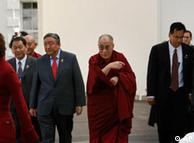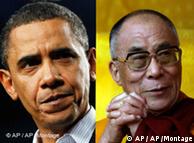「中國不想看到的會面」
《衛報》頭版頭條刊登了奧巴馬和達賴喇嘛會晤的照片,標題是:「奧巴馬-喇嘛:中國不想看到的照片」。內頁報道文章強調了這次會晤的低調。
該報記者發自華盛頓的這篇報道也注意到了達賴喇嘛會晤後的輕鬆情緒,他甚至在白宮外玩兒起了雪。報道說,這同這次會晤及其可能產生的嚴重後果形成了鮮明的對比。
報道說,奧巴馬給了達賴喇嘛一個多小時的時間,即在禮節上過得去,也表明不會屈從中國不讓他會見的壓力。

達賴喇嘛的美國之行給中美關係增加了新「熱點」。
但記者也注意到,白宮在努力把這次會晤的影響降至最低。會晤時不僅沒有電視畫面,會晤本身也發生在白宮地圖室而非奧巴馬的橢圓形辦公室,突顯會晤的非正式性質。
《金融時報》也在頭版刊登了達賴喇嘛在白宮外會見記者的照片。內頁文章側重分析了這次會晤對中美關係的影響, 並列舉了中美之間潛在的「熱點」,包括人民幣匯率、台灣問題、谷歌事件、西藏問題、伊朗問題、人權和氣候變化問題。
不過,作者也引述美國外交人士的話說,目前兩國關係的困難有被誇大的成分。儘管北京威脅制裁,美國作為亞太軍事和外交大國的地位仍然使美國在比如會晤達賴喇嘛這樣的問題上比其它國家更有餘地。
北京調整西藏政策?
《金融時報》周四說,達賴喇嘛與奧巴馬見面之際,西藏問題專家則在捉摸北京最近舉行的有高級領導人參加的西藏問題會議是否有跡象顯示北京有可能對西藏政策作出調整。
報道說,北京西藏問題會議結束後發表的聲明中並沒有新項目的清單,相反則強調改進人力資本,並表示到2020年農村收入應當被提高到全國平均水平。在一些中國西藏問題專家來看,這表示北京在對西藏政策上有了轉變。
該報說,1月份的西藏會議的另一個新提法是北京宣佈對西藏的政策也適用於其他藏人居住地區。大約一半的藏人居住在西藏周圍的四個省份。
Obama Meets Dalai Lama, and China Is Quick to Protest

The Dalai Lama spoke to the news media outside the White House after meeting with President Obama on Thursday.
WASHINGTON — President Obama met with the Dalai Lama on Thursday, welcoming the exiled Tibetan spiritual leader to the White House for a low-profile meeting that nonetheless raised the hackles of China.
The two men spoke about democracy, human rights and the need to preserve Tibet’s religious identity and culture — all issues that, predictably, irritated Beijing.
In a written statement, the White House said Mr. Obama had expressed support for the preservation of Tibet’s “unique religious, cultural and linguistic identity and the protection of human rights for Tibetans in the People’s Republic of China.”
The meeting, which the White House put off last year so as not to interfere with Mr. Obama’s trip to Beijing in November, is the latest evidence of the more muscular posture that the Obama administration has been adopting with China, after a year in which China has taken a firm stance in its relations with the United States on a number of issues.
Last month, the administration announced a $6 billion arms sales package to Taiwan, infuriating Chinese officials.
The meeting on Thursday between Mr. Obama and Tenzin Gyatso, the 14th Dalai Lama, did not please Chinese officials, either.
China, which regards the Dalai Lama as an advocate of Tibetan independence, said that it was “strongly dissatisfied” and that it expected the United States to try to make amends.
On Friday, China accused Mr. Obama of “seriously damaging” ties between the two countries, the spokesman for the Chinese Foreign Ministry, Ma Zhaoxu, wrote in a statement posted on the ministry’s Web site.
China also summoned the American ambassador, Jon Huntsman, to lodge a formal complaint about the meeting at the White House, the statement online said.
While the White House took pains to avoid the appearance that this was a meeting between heads of state — it took place in the White House Map Room, not in the Oval Office — the Dalai Lama also met with Secretary of State Hillary Rodham Clinton at the State Department.
“The Dalai Lama is a Nobel Peace Prize laureate, internationally revered religious and cultural leader,” said Mark Toner, a State Department spokesman, explaining why the country’s senior diplomat would meet with him. Mr. Toner said other secretaries of state had also met with him.
The White House went out of its way to keep the meeting low-key.
White House officials did not allow reporters or photographers to see Mr. Obama and the Dalai Lama together, and they released a single official photograph after the meeting.
The Dalai Lama did meet with reporters at the White House afterward, and said he was happy with the visit. He also tossed some snow at reporters.
In deference to China, American presidents usually do not meet publicly with the Dalai Lama. President George W. Bush broke with that tradition in 2007 when he attended a ceremony in the Capitol Rotunda in which Congress gave the Dalai Lama its highest civilian honor, the Congressional Gold Medal.
The Dalai Lama has lived in exile in India since the Chinese Army crushed an uprising in his homeland in 1959, and he is revered as the spiritual leader of Tibetan Buddhists. He has been pressing to return to China to advocate for greater cultural and religious freedoms for his followers. He has said he wants only genuine autonomy for Tibet, not independence.
时事风云 | 2010.02.19
奥巴马会晤达赖喇嘛与美国对华关系新走向
美国总统奥巴马当地时间周四会见了正在美国进行访问的西藏流亡精神领袖达赖喇嘛,会谈没有安排在总统通常接见国宾的椭圆形办公室,而是在旁 边的地图室(Map Room)进行。会谈持续了45分钟左右,两人并未共同在摄像镜头前露面。不少媒体将奥巴马的这一安排解读为"不想更多地激怒北京"。
对此,中国政府如同以往地发出了强烈的抗议。中国外交部副部长崔天凯周五召见了美国驻华大使洪博培,就奥巴马总统会见达赖喇嘛一事提出"严正交 涉"。据法新社报道,美国大使馆的一名发言人证实了这一消息,但并未提供进一步的细节信息。此前,中国外交部发言人马朝旭指责"美方的行为严重违背国际关 系基本准则",并称此举"干涉了中国的内政",且"伤害了中国人民的感情"。
自从1989年达赖喇嘛被授予诺贝尔和平奖以来,历届的美国总统都曾经与其会面。中国政府对美方此类举动的回应也一向都是"强烈抗议"或"严正交 涉",甚至指责美方的言辞也基本相同。比如,2007年10月,在前总统小布什会见达赖喇嘛,并且美国国会向达赖喇嘛颁发金质奖章之后,中国外交部发言人 就指出:"美国领导人会见达赖严重违背国际关系基本准则,严重伤害中国人民的感情,是对中国内政的粗暴干涉。……中方再次敦促美方纠正错误,停止以任何方 式干涉中国内政。"
 Bildunterschrift: 达赖喇嘛步出白宫
Bildunterschrift: 达赖喇嘛步出白宫
不过,在现任美国总统奥巴马会见达赖喇嘛之际,中国政府发出的抗议之中,除了一贯常用的谴责言词之外,似乎比过去多了一丝强硬和具体的内容。比如,关于有可能抛售巨额美国国债,或是对美国企业进行抵制这样的威胁都成为媒体讨论的话题。
德国政治学家克里斯蒂安·哈克(Christian Hacke)在接受德国之声采访时表示,奥巴马必须面对已经发生改变的国际形势,"我们必须清楚地看到,中美关系之间的力量对比已经发生了微妙的变化,并 且正在向有利于中国的方向推移,不管是在经济危机的背景下,还是在其它领域。在奥巴马去年访华的时候,中国人已经表现出极大的自信心。这就意味着,美国对 华政策的回旋余地变得越来越小了。"
在美国,总统奥巴马与达赖喇嘛的会面被政治观察人士看作是从一种"充满希望的友好政策"转向明晰的利益外交政策的表现之一。曾经担任美国国务院西藏 问题协调员的凯丽·克瑞(Kelly Currie)表示:"美国政府在去年试图向中国伸出友好的手,但是在一些根本性的问题上这种姿态并没有带来什么成效。"
比如在制裁伊朗、解决朝核问题以及气候保护方面,美国认为中国政府不够合作。而中国则对美国在对台军售以及贸易争端上的立场感到气恼。与不少美国分 析人士一样,凯丽·克瑞认为,会见达赖喇嘛可能标志着美国对华政策的一个新开端,意味着奥巴马开始回到更加符合美国国家利益的现实主义路线上去。


沒有留言:
張貼留言